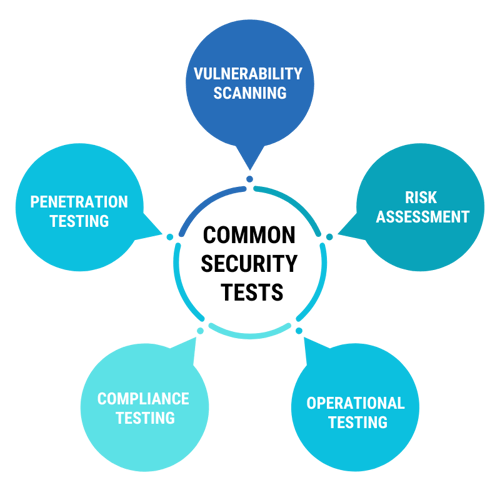
The gaming industry has seen a rapid growth over the past five years, starting with the expansion of sports betting in the state of New Jersey and online and mobile gaming options also becoming available in other states. A few states have also launched iGaming along with sports betting.
The introduction to new gaming technology requires operators to complete various forms of security testing. Security testing is crucial to ensuring the integrity and security of gaming systems. It is a process of evaluating the security of a system or application by identifying vulnerabilities, assessing the risks, and testing the system's response to potential attacks.

Article Sections
What Are the Common Security Tests Performed in the Gaming Industry?
![]() Penetration Testing: This involves simulating real-world attacks on the system to identify vulnerabilities and assess the system's ability to detect and respond to those attacks.
Penetration Testing: This involves simulating real-world attacks on the system to identify vulnerabilities and assess the system's ability to detect and respond to those attacks.
![]() Vulnerability Scanning: This involves the use of automated tools to identify potential vulnerabilities in the system, such as weaknesses in the software or configuration errors.
Vulnerability Scanning: This involves the use of automated tools to identify potential vulnerabilities in the system, such as weaknesses in the software or configuration errors.
![]() Compliance Testing: This involves testing the system to ensure that it complies with relevant laws, regulations, and industry standards, such as the GLI-33 or GLI-19 standards for electronic gaming devices.
Compliance Testing: This involves testing the system to ensure that it complies with relevant laws, regulations, and industry standards, such as the GLI-33 or GLI-19 standards for electronic gaming devices.
![]() Operational Testing: This involves testing the system in a live environment, simulating real-world scenarios, such as heavy traffic, to ensure that the system can handle the load and maintain its security.
Operational Testing: This involves testing the system in a live environment, simulating real-world scenarios, such as heavy traffic, to ensure that the system can handle the load and maintain its security.
![]() Risk Assessment: This involves evaluating the potential risks to the system and identifying countermeasures to mitigate those risks.
Risk Assessment: This involves evaluating the potential risks to the system and identifying countermeasures to mitigate those risks.

What is Working Well in Security Testing for the Gaming Sector
Standard Testing Frameworks
One of the key success factors is the use of industry-standard testing frameworks such as the GLI standards (GLI 19 B, 27 currently being updated, and 33 B), Payment Card Industry Data Security Standard (PCI DSS), and the National Institute of Standards and Technology (NIST) Cybersecurity Framework.
These frameworks provide a comprehensive set of guidelines and best practices for protecting sensitive customer data and ensuring the integrity of gaming systems.
Gaming operators that adhere to these standards and undergo regular security assessments have been able to effectively identify and remediate vulnerabilities in their systems.
Penetration Testing and Vulnerability Scanning
These techniques allow gaming operators to simulate real-world attacks and identify vulnerabilities in their systems before attackers can exploit them.
This proactive approach has been instrumental in helping operators identify and remediate vulnerabilities before they can be exploited.
Our testing experts at Bulletproof can identify vulnerabilities that could pose risks to both the operators and their players. The results of these tests allow the vulnerabilities to be fixed prior to exploitation.
Security Regulations
While I am not a fan of just compliance for the sake of compliance, there is no argument that having these requirements forces operators and suppliers to perform basic security assessments. While a certain number of operators would perform these even if they were not obligated, there is a decent percentage that would not.
Having security testing in the regulations at least ensures these independent security assessments are performed regularly.
However, as I always like to say, “compliance does not equal security, but if you are secure, you will be compliant.”
Too often, organizations approach compliance-oriented security assessments as a check-box approach, rather than making sure they are really taking steps to increase their security posture.
What is Not Working Well in Security Testing for the Gaming Sector
Moving Targets
One of the biggest challenges is keeping up with the ever-changing threat landscape. New vulnerabilities and attack methods are constantly emerging, and it can be difficult for gaming operators to stay up-to-date with the latest threats and vulnerabilities. This has led to a lack of preparedness in some cases, with breaches occurring.
Also, just because a gaming operator conducts a security assessment does not indicate that they are immune from attacks.
In some cases, the current requirements do not include tests/reviews that would identify risks in emerging attacks. Recent reports of operators such as DraftKings and BetMGM experiencing data breaches or takeover attacks have made news headlines. In every case, the operators were up to date with the required security tests.
Third-Party Vendor Management
Many gaming operators rely on third-party vendors for a variety of services, such as payment processing and customer data storage.
However, not all vendors have the same level of security in place, and this can create vulnerabilities in the gaming operator’s systems.
It's essential for gaming operators to conduct thorough security assessments of their third-party vendors and ensure that they have adequate security measures.
Lack of Standardization Across Jurisdictions
Different countries and states have different security testing requirements, and it can be difficult for gaming operators to keep up with the various regulations and standards.
This lack of standardization can lead to confusion and inconsistencies in security testing, making it harder for operators to ensure the safety and integrity of their systems.
What Can Be Done?
We are starting to make progress, although slowly. Last year, Dan Hartman, the Director of Colorado Division of Gaming, organized a security and integrity working group to discuss these challenges and possible solutions. The goal was to agree on standard terminology, approach, requirements, and reporting. Progress has been made; and it’s a step towards the right direction; however there’s still room for improvement and opportunity.
I do not have all the answers, however I do believe the current process is not scalable and sustainable as gaming continues to expand. Operators such as BetMGM, Caesars Digital, and FanDuel, that are in every legal jurisdiction should not have to report separately state by state, and on different timeframes when the majority of their security controls are similar. This is where the concept of continuous compliance comes into play.
With continuous compliance, gaming operators could proactively identify and address security issues in their systems, rather than waiting for a regulatory audit or incident to occur. This approach allows gaming operators to maintain a state of ongoing compliance with relevant regulations and standards, and to address security issues as they arise.
Bulletproof is currently developing a framework that would allow operators to track and show compliance with these security requirements more easily. Obviously, this would be smoother if the regulations were standardized, however, even if we cannot get to that point yet, GLI and Bulletproof are committed to designing solutions that allow us to meet the requirements that the regulations specify and, at the same time, have less friction for operators so that they can focus on their core business.
![]()
Continuous compliance as it relates to security testing in the gaming sector refers to the ongoing process of ensuring that a gaming operator's systems and practices meet the relevant security regulations and standards.
This includes regular security testing and assessments, as well as ongoing monitoring and remediation of vulnerabilities.
Conclusion
.png?width=300&height=400&name=HS%20CTA%20Gaming%20eBook%20(1).png)
A Guide For How Gaming Organizations Can Tackle I.T. and Security Hurdles
Today’s digital landscape has changed how the gaming industry operates, introducing new platforms, devices, and even business models. With the rise of online gaming and the exponential popularity of smartphones, gaming organizations need to adapt, pivoting with consumer behaviors. But this technological shift has also opened the door to more cybercrime than ever.
Many key players in the industry aren’t fully aware of how cyber threats have grown, both in severity and frequency. They may have IT staff in place to respond to threats, but no way of knowing if their defenses are really able to handle new challenges.
Learn how to strengthen your defenses against modern cybercriminals with this eBook.
Want to learn how your organization can take your information security testing to the next level?
Bulletproof has locations across North America and around the globe with decades of gaming, IT, security, and compliance expertise, enabling businesses to grow profitability and to protect their reputation and integrity.
We were named 2021 Global Security Partner of the Year for delivering excellence and innovative end-to end security solutions and are a member of the Microsoft Intelligent Security Association (MISA).
Complete the form to get in touch with our experts.

![Microsoft Partner of the Year [POTY] Logo_White Transparent Microsoft Partner of the Year [POTY] Logo_White Transparent](https://content.bulletproofsi.com/hs-fs/hubfs/Microsoft%20Partner%20of%20the%20Year%20%5BPOTY%5D%20Logo_White%20Transparent.png?width=400&height=146&name=Microsoft%20Partner%20of%20the%20Year%20%5BPOTY%5D%20Logo_White%20Transparent.png)

